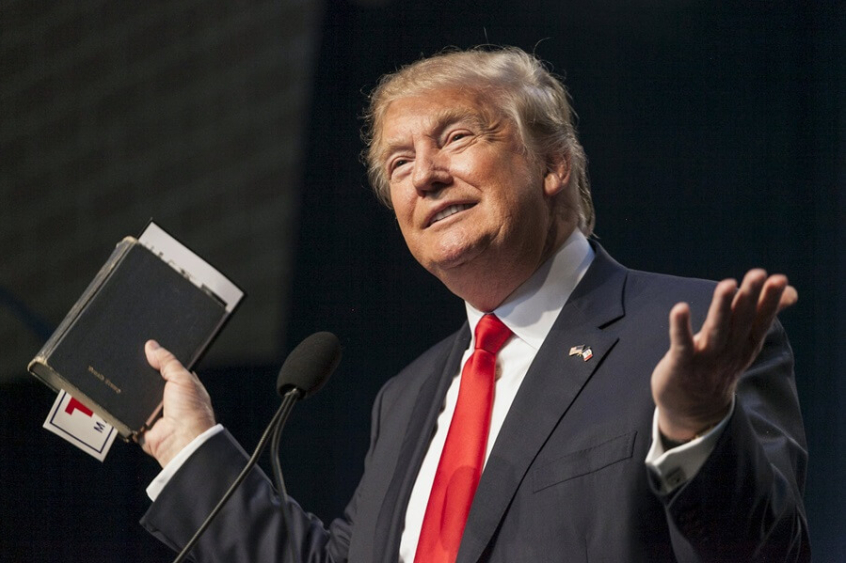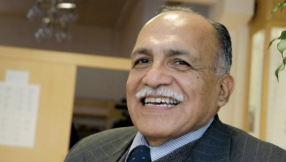
Donald Trump will be the 45th President of the United States. After defeating Democrat hopeful Hillary Clinton in a shock win overnight, the New York billionaire will in January be inaugurated and move into the White House.
And one of his main supporter groups? White evangelical Christians. According to polls, they backed Trump by 81 per cent to 16 per cent – a larger margin of the evangelical vote than was achieved by a Republican candidate in the past three elections.
Trump's relationship with US Christians has been somewhat rocky. He campaigned hard for the evangelical vote, and initially managed to gain widespread support – winning the endorsement of Liberty University president Jerry Falwell Jr, author Eric Metaxas and pastor of First Baptist Church Dallas, Robert Jeffress. And they weren't the only ones. As the world watched on in bewilderment, numerous leading Christian figures lined up to gush over Trump's candidacy.
But he was mocked a fair amount, too, and questioned about his self-proclaimed Christian faith. When asked to name his favourite Bible verse in August last year he refused to respond, saying the answer would be too personal, leading critics to ask whether he actually knew any. A few weeks later he said he liked Proverbs, in particular "the chapter 'never bend to envy'", which doesn't actually exist.
Then in April, he was asked again by a US radio station whether he has "a favourite Bible verse or Bible story that has informed your thinking or your character through life?". Trump responded "an eye for an eye", failing to note that Jesus shut down that verse from Leviticus pretty swiftly, urging Christians to respond with forgiveness and love – not vengeance.
Of course, Trump himself has admitted that he has never actually asked God for forgiveness, so perhaps no surprises there.
He committed another faux pas and was ridiculed by Christians for referring to a chapter in the Bible as 'Two Corinthians' – the usual phrasing in Britain, but Americans typically refer to it as 'Second Corinthians'. He was derided by commentators, and students at Liberty University, whom he was addressing, openly laughed at the perceived error. (It's important to note that more than 2,000 Liberty students – one of America's largest Christian colleges – signed a petition opposing Trump, in doing so critiquing Falwell Jr's support).
Trump even got into a spat with Pope Francis over his repeated promises to build a wall dividing the US from Mexico, and a senior official in the Presbyterian Church – into which Trump was baptised as a child – slammed the candidate's hardline immigration policies.
So he wasn't always considered the true 'Christian candidate', despite running under the Republican banner, which has typically enjoyed the majority of white evangelical support. And yet, in the midst of this fragile relationship, Trump evidently won the evangelicals over.
His declarations of personal faith appeared to gain more credence among evangelicals as his campaign went on.
Evangelist Paula White was credited with leading Trump to faith, and though she refused to comment specifically, she told the Christian Post: "I can tell you with confidence that I have heard Mr. Trump verbally acknowledge his faith in Jesus Christ for the forgiveness of his sins through prayer, and I absolutely believe he is a Christian who is growing like the rest of us. I know that from many personal conversations."
James Dobson, founder of the conservative Focus on the Family, called Trump a "baby Christian", waving away his more controversial statements by saying the candidate simply "doesn't have a clue about how believers think, talk and act".
"All I can tell you is that we have only two choices, Hillary or Donald," Dobson added. "Hillary scares me to death. And, if Christians stay home because he isn't a better candidate, Hillary will run the world for perhaps eight years. The very thought of that haunts my nights and days."
Support did appear to be crumbling just a few weeks ago following the release of a video tape from 2005 in which Trump could be heard openly speaking about groping women and trying to seduce a married woman. It caused particular waves among conservative voters and previously supportive voices, including theologian Wayne Grudem, began to waver.
Grudem announced that he was withdrawing his support for the Republican candidate and urged Trump to pull out from the race. (He then later changed his mind again – announcing that he would vote for Trump after all.)
Evangelical author Beth Moore spoke publicly of her own experience of sexual assault and said to evangelical leaders who still supported Trump: "Try to absorb how acceptable the disesteem and objectifying of women has been when some Christian leaders don't think it's that big a deal." Russell Moore, of the Southern Baptist Commission's Ethics and Religious Liberty Commission, reiterated his own opposition to the candidate.
But yet more stood by him.
One classic trope espoused by Trump-supporting Christians was that they weren't necessarily endorsing his 'lifestyle' by giving him their vote. Trump's repeated promises to protect Christianity hit the spot with evangelicals convinced they've been persecuted under the Obama administration, but arguably abortion won out as the key electoral issue. Many Christians consider abortion – and therefore the appointment of conservative Supreme Court justices – as the main issue. Trump's apparent pro-life stance against Clinton's pro-choice saw him clinch their votes.
Jenn Johnson, of Bethel Church in Redding, California, and daughter-in-law of leaders Bill and Beni Johnson, posted on Instagram yesterday suggesting that voting for Trump was the real way of supporting the 'Black Lives Matter' movement because of the high number of black women who have abortions:
A petition signed by nearly 80 evangelical leaders last month said Trump's candidacy had "given voice to a movement that affirms racist elements in white culture." "This is a campaign run on racial resentment and white nationalism," Jim Wallis, founder and president of Sojourners, told Christian Today. And yet, abortion evidently remained the key issue for evangelical voters – over and above the treatment of minority groups.
Jeffress told National Public Radio: "What they're [evangelicals] saying is this is a binary choice between one candidate, Donald Trump – who is pro-life, pro-religious liberty, pro-conservative justices of the Supreme Court – and another candidate, Hillary Clinton, who has an opposite view on all of those issues."
Falwell even said he would continue to support Trump if the numerous allegations of sexual assault lodged against him proved to be true, because he was better "qualified" for presidency than Clinton – a viewpoint directly contradicted by 50 former national security officials, among numerous others. In a letter published in August, the signatories warned that Trump "lacks the character, values and experience to be president... He weakens US moral authority as the leader of the free world."
Of course, whatever Trump's true faith – or the legitimacy of the reasons behind his evangelical support – it remains that he will take office in January and lead the US for the next four years, at least.
Evangelical figures across the political spectrum today signed a declaration calling for unity amid the "deeply divisive nature of this election cycle". Christians around the world will be looking to these leaders to see how gracefully they live that out.













